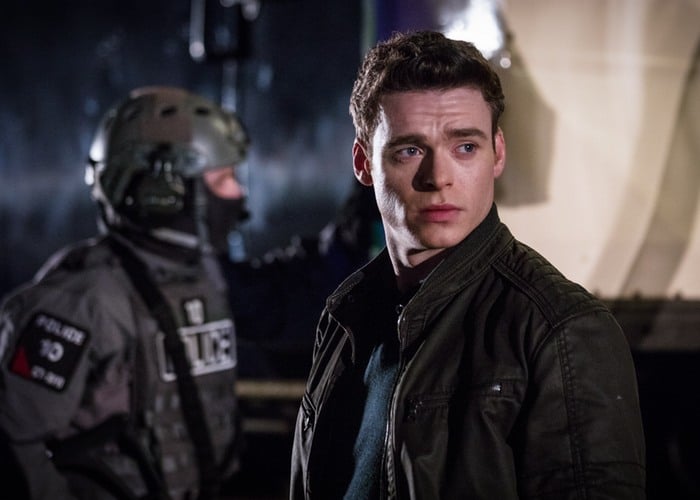
Buried beneath the giant pile of Netflix originals the service put out this year, Bodyguard was released with very little promotion. Most people probably never heard of it until it was nominated for two Golden Globes, including Best Drama Television Series. The show delivers some of the best television writing that has come out of 2018 in just six episodes. Along with fantastic characters, Bodyguard keeps the audience on their toes with several exciting scenes that are each finale worthy. We’ll take a look at some of those scenes that feature bomb threats, snipers, or more to give the thrilling show the recognition it deserves.
In short, this crime thriller is about David Budd (Richard Madden), an Afghanistan veteran serving as a protection officer for the less than loved Home Secretary Julia Montague (Keeley Hawes). He’s assigned to Montague after successfully talking down a suicide bomber on a train he was boarded with his kids. From there, things continue to pull Budd away from his family and deeper into a violent conspiracy involving the British government, often forcing him to make bad decisions to expose the truth.
The pilot opens with Budd on a train with his two sleeping young children. Everything seems tranquil until he watches a man quickly end a phone call dispose of his phone before boarding the train. Budd tries to ignore it, but the train attendant becomes frantic when someone won’t leave the bathroom on the train. As is true throughout the series, Budd cannot sit idly by when something may be wrong. He leaves his kids with a nice passenger and joins the attendant, alerting her he is a police officer asks about a suspicious “Asian male” on the train. The attendant says that there was a threat of a bomber boarding a train to London and worries he is in the bathroom. The scene is propelled into quick, fast-moving drama from there and never slows until the very end.
Expertly, the show’s protagonist never leaves the action to anyone else throughout this first scene. David Budd is a man who likes control and will do anything to help a dangerous situation, even if it means going against instruction. Knowing his kids and hundreds of other people are on the train, Budd comes up with a plan. He listens for the suspect in the bathroom rustle around and decides to push him out the train door as soon as he exits the bathroom. His plan falters, though, when a man exits the bathroom without a bomb or anything suspicious. Budd alerts the attendant the suspect isn’t dangerous and the audience gets a breather. Thankfully, the show never leaves much time to recover. Budd goes to check the bathroom for any other signs of a bomb just in case and finds a distraught young woman Nadia with an explosive vest strapped around her body and her thumb hovering the trigger. A new challenge is thrown at Budd; he now has to talk down a woman ready to blow up the train.
The threat of the bomb isn’t the only aspect of the scene that brings danger. Many shows would simply rely on the obvious threat, but Bodyguard adds more than just a bomb. The woman holding the trigger is hysterical, nervous, and afraid of getting arrested despite not wanting to push the trigger. She’s not just armed, but she’s unpredictable. Budd does what he is great at and talks her down, building trust and assuring her she won’t be hurt if she just promises not to push the trigger. Nadia and David bond, but just as things seem like they will be okay, the train slows to a stop where the police are waiting and Nadia freaks out, trying to shut herself into the bathroom again. Along with the threat of a bomb and an unpredictable bomber, now more people are added into the mix, taking the control of the situation away from Budd.
As armed police officers rush the train, snipers set up outside preparing for a critical shot of the bomber. To the people who hadn’t been talking with Nadia for the past ten minutes, killing her would be the safest option to prevent her from blowing up the train. Budd knows she doesn’t want to die and ignores the orders of the other police officers to protect her. He guards her against being a clear target for the sniper by risking his own life until an explosive expert will come to remove the vest and secure it. Budd’s inability to let anyone else take over adds to the tension of the scene. He ignores the instruction of superior officers and does what he thinks is right, which adds more drama to an already crazy scene. Eventually, the vest is removed and everyone is safe, but this is a show that will continue to add exciting scenes like this to the plot.
In case you forgot, this is the first scene of the entire series. Leading with Budd talking down a suicide bomber on a train carrying his kids is a bold move unless the series will get more exciting following this dynamite first scene, and it certainly does. This first scene has everything an opening scene should: high stakes, introduction to the main character through action, unpredictability, and loads of conflict. Not many shows bring all of this within the first 2 minutes of a show, but Bodyguard does and with absolutely no need for any setup. It’s just the kind of scene a thriller needs to hook the audience in and make them pay attention to the story that follows.
Some other shows that revolve around police and crime usually use scenes like that to end an episode as a climax that leads to some resolution in the case that the episode has covered. Bodyguard never relies on high tension scenes to make the preceding minutes of an episode worth it. The show only has six episodes, so it cannot afford to waste time on setting up or prolonging the climax of the episode. Every scene needs to be In the pilot, the show begins with a crazy scene and throughout the rest of the season, scenes like that happen at any given point during the episode. There’s not a formulaic structure to the tension throughout the season, so these kinds of scenes are not just incredibly exciting, but they’re a surprise every time.
Since the show is a serial, every episode builds upon the last. The plot moves along from where the last scene, but so do the high tension scenes. Because of the bomb threat in the first scene of the show, Budd is able to keep the Home Secretary calm while the two of them are being shot at in her car. That scene is one of two terribly exciting scenes in the second episode. Each incident may be something new to the audience, but each high tension scene is amplified by Budd’s continuously dangerous actions. He is able to keep Julia calm while they’re being shot at, but like in the train scene, Budd cannot let himself be a sitting duck. They don’t know where the shooting is coming from and reinforcements are minutes away. Budd puts himself in danger and gets out of the car to see where the shooting is coming from. A gunshot barely misses him as he reaches around the car to take a picture where he thinks the shooting is coming from, finding out a sniper is stationed on top of a building across the street. He tries to wait for other authorities to come and save them, but can’t allow anything worse to happen, so Budd takes action again. He drags the dead driver out of the front of the car and begins driving towards where the shooting is coming from, only in reverse. Budd then abandons the car and runs to the roof of the building, ready to take on the shooter without any hesitation. To his and the audience’s surprise, the shooter is his friend, a veteran as well who talked to David about his hatred for Julia Montague and the other politicians like her. He shoots himself in front of David, ending the threat, but not the conflict of the scene. It carries over, bleeding into the exciting scenes that follow.
David Budd is one reason each high tension scenes in Bodyguard transcends anything else on TV right now. He’s impatient, never willing to wait to get out of a dangerous situation, so each scene is constantly moving to a new threat. He’s proactive, always at the forefront of the action no matter how dangerous. He’s rogue, often disobeying orders and at odds with his peers. He commands every scene he’s in, even though his job is to stand and observe. There is so much to love in Bodyguard, but everything well written relates back to its solid main character.
Bodyguard ‘s impeccable high tension scenes are wrought with drama, but never melodramatic. They’re a prime example of what fictional crime shows should be striving for when trying to surprise audiences. The two scenes discussed are just a taste of how remarkable the writing is in this show, but you can really only appreciate it if you see it for yourself. If you haven’t already, spend your next binge on Bodyguard. If you have, tell your friends about it and do a better job promoting this fantastic show than Netflix did.
Related Topics: Crime, Netflix

